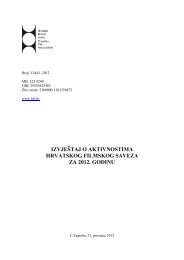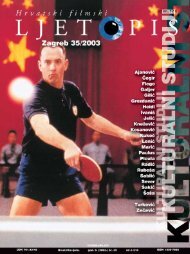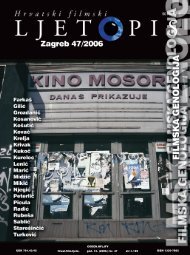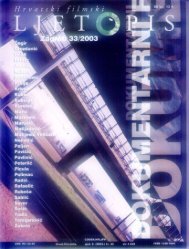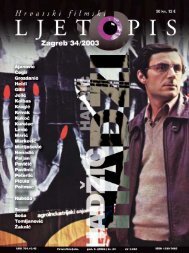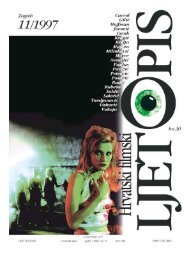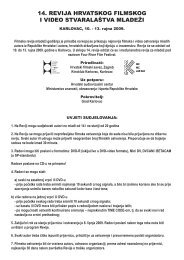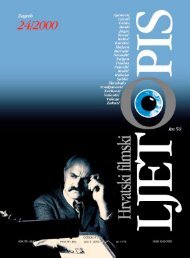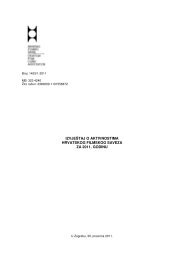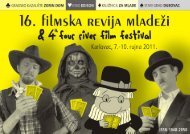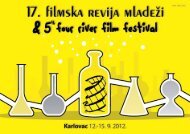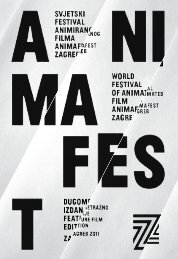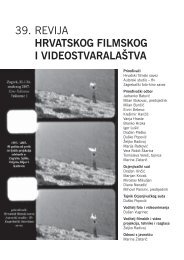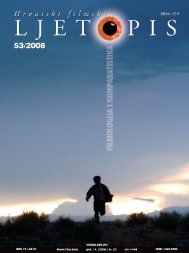You also want an ePaper? Increase the reach of your titles
YUMPU automatically turns print PDFs into web optimized ePapers that Google loves.
»metodolo{kim teorijama« postavlja pitanje izbora odre|ene perspektive<br />
koja potom sna`no utje~e na odre|ivanje podataka i na zaklju~ke. Tre}u<br />
skupinu teorija odre|uje istra`ivanje specifi~nih istra`iva~kih polja. Casetti,<br />
me|utim, isti~e va`nost u`itka u istra`ivanju, kvalitete postavljenih pitanje<br />
i gusto}e dobivenih odgovora.<br />
Mirko Petri}<br />
I semiotika i kognitivizam?<br />
UDK: 791.32(049.3)<br />
Povezivanje semiotike i filma u naslovu knjige Warrena Bucklanda mo`e<br />
zazvu~ati kao oksimoron, ne odve} uvjerljiv u kontekstu stru~ne rasprave.<br />
Buckland je svjestan toga problema i obja{njava sukob izme|u kognitivnih<br />
teoreti~ara filma i onih teoreti~ara ~ija se filmska teorija temelji na lingvistici<br />
i semiotici. Kognitivna teorija filma (Bordwell, Carroll...) akademski<br />
legitimitet djelomice temelji upravo na odbacivanju postavki filmske semiotike.<br />
Buckland me|utim ukazuje na skupinu europskih znanstvenika koji<br />
su razvili premise za program koji se mo`e nazvati »kognitivnom semiotikom<br />
filma«. Buckland `eli zajednici engleskog govornog podru~ja predstaviti<br />
rad Francesca Casettija i kasnoga Metza, potom rad Rogera Odina, Michela<br />
Colina i Dominiquea Chateaua, s zaklju~kom utemeljenim na Odinovoj<br />
razradi lingvisti~kih postavki Noama Chomskog (transformacijska generativna<br />
gramatika). Premda koncepcija kognitivne semiotike filma nije<br />
sasvim uvjerljiva, Bucklandova je analiza va`nih teorijskih problema svejedno<br />
zanimljivija od mnogih glasovitih novijih teorijskih studija.<br />
Tomislav Brlek<br />
Privid zablude<br />
UDK: 791.633-051Téchiné, A.<br />
791.221/.228(44)<br />
Sedam godina nakon filma Les voleurs (Lopovi), novi film Andréa Téchinéa<br />
u potpunosti je ispunio opravdano velika o~ekivanja potencirana dugim<br />
~ekanjem. Film u prvi plan isti~e upravo raznovrsne oblike dinamike<br />
odnosa, kako u prostoru, tako i me|u likovima, razvijaju}i omiljenu Téchinéovu<br />
problematiku oblika i me|uodnosa dru{tvene i psiholo{ke inicijacije.<br />
Kao i uvijek u Techinéovim filmovima, gluma~ke su izedbe besprijekorne,<br />
a osobito se isti~e maestralna Emmanuelle Béart. Iznimno slo`ena dinamika<br />
odnosa me|u likovima, oblikovana bri`ljivim nijansiranjem arhetipske<br />
strukture, ostvaruje se prvenstveno kroz neizre~eno i nazna~eno. Téchiné<br />
op}enito sustavno izbjegava »velike« prizore, a uglavnom ne koristi ni orijentacijske<br />
kadrove, pru`aju}i tako glumcima priliku da likove razvijaju u<br />
vremenu, kroz sekvence, a gledateljima da, tako|er postupno, sami rekonstruiraju<br />
prostorne odnose.<br />
Dejan D. Markovi}<br />
Ameri~ki (anti)ratni film: sanitizovani<br />
pogled na stvarnost<br />
UDK: 791.222(73)(091)<br />
Tekst pru`a sa`et kriti~ki pregled povijesti holivudskog ratnog i antiratnog<br />
filma, s posebnim osvrtom na filmove oVijetnamskom ratu. Glavna je teza<br />
pritom da ameri~ki (anti)ratni filmovi daju sanitizirani pogled na rat. Klasi~ni<br />
holivudski ratni film — onaj o Drugom svjetskom ratu posebno — prikazivao<br />
je rat kao popri{te herojstva i poligon patriotizma. Rat je u svojoj<br />
(krvavoj) autenti~nosti prikazan tek u filmovima onih redatelja koji su rat<br />
(Drugi svjetski, Vijetnamski) do`ivjeli iz prve ruke, odnosno pro`ivjeli kao<br />
vojnici — u radovima Samuela Fullera (The Big Red One) ili Olivera Stonea<br />
(Platoon). Poraz klasi~ne, nacionalisti~ke matrice `anra (inkarnirane u<br />
liku Johna Waynea) pogotovo su uzrokovali »vijetnamski« filmovi poput<br />
Apokalipse sada i Lovca na jelene, budu}i da se s tim ratom izgubila jednostavna<br />
podjela na pozitivce i negativce i promijenio pogled same ameri~ke<br />
publike na ameri~ku vanjsku politiku. S tim filmovima prestaje i izravan<br />
utjecaj dr`avne politike na propagandne kvalitete holivudskih filmova. No,<br />
i »vijetnamski« filmovi prikazuju »svoj« rat autenti~no podvrgavaju}i povijest<br />
radu holivudskih narativnih konvencija. Kako u slu~aju ovog rata nije<br />
bilo »jednostavne«, za ameri~ku stranu pozitivne povijesti, rat je prikazan<br />
206<br />
Hrvat. film. ljeto, Zagreb / god 11 (2005), br. 42, str. 203 do 211 Sa`eci / Summaries<br />
Second group of film theories that Casetti had entitled »methodological<br />
theories«, introduced the question of the choice of a particular perspective<br />
that subsequently strongly influences identification of data and the conclusions.<br />
The third group of theories determined the research of specific fields<br />
of research. However, Casetti stresses the importance of enjoyment in the<br />
research, the quality of questions asked and the consistency of answers.<br />
Mirko Petri}<br />
Both semiotics and cognitivism?<br />
UDK: 791.32(049.3)<br />
Connecting semiotics and film in the title of Warren Buckland’s book may<br />
sound as an oxymoron, not very persuasive in the context of expert discussion.<br />
Buckland is aware of this problem and explains the conflict<br />
between cognitive theoreticians of film and the authors who base their film<br />
theory on linguistics and semiotics. Cognitive theory of film (Bordwell,<br />
Carroll...) draws its academic legitimacy precisely on the rejection of precepts<br />
of film semiotics. Buckland, however, identifies a group of European<br />
scientists who developed tenants for the program that could be called<br />
»Cognitive Semiotics of Film«. Buckland wants to present to English speaking<br />
countries the work of Francesco Casetti and late Metz, as well as the<br />
work of Roger Odin, Michel Colin and Dominique Chateau, with the conclusion<br />
based on Odin’s elaboration of Noam Chomsky’s linguistic precepts<br />
(transformational generative grammar). Although the concept of cognitive<br />
semiotics of film is not too credible, Buckland’s analysis of important<br />
theoretical problems remains more interesting than many famous recent,<br />
theoretical studies.<br />
Tomislav Brlek<br />
Strayed illusions<br />
UDK: 791.633-051Téchiné, A.<br />
791.221/.228(44)<br />
Seven years after the film Thieves (Les voleurs), new film by André Téchiné<br />
completely fulfilled great expectations incited by the long wait. The film<br />
puts in the foreground various forms of relationship dynamics, both in<br />
space and between the characters, developing Téchiné’s favourite problematics<br />
of forms and interrelations of social and psychological initiation.<br />
As always in Téchiné’s films, acting is flawless, but masterly Emmanuelle<br />
Béart still stands out. Extremely complex character dynamics, shaped by<br />
careful nuancing of the archetypal structure, establishes itself primarily<br />
through the unsaid and outlined. Téchiné generally and systematically<br />
avoids »great« scenes, and rarely uses master shots, offering actors the<br />
opportunity to develop characters in time, through sequences, and the<br />
viewers to gradually reconstruct spatial relations.<br />
Dejan D. Markovi}<br />
American (anti)war film — Sanitized<br />
view of reality<br />
UDK: 791.222(73)(091)<br />
This text offers a concise critical overview of the history of Hollywood war<br />
and antiwar film, with an emphasis on films about the Vietnam war. The<br />
main theses of the text are that American (anti)war films offer a sanitized<br />
view of war. Classical Hollywood war film — especially those about World<br />
War II — described war as a stage for heroism and proving ground for<br />
patriotism. War is represented in its (bloody) authenticity only in films by<br />
those directors who witnessed the war (World War II, Vietnam) first hand,<br />
that is to say, as soldiers — in the works by Samuel Fuller (The Big Red One)<br />
or Oliver Stone (Platoon). »Vietnam« films like Apocalypse Now and The<br />
Deer Hunter caused the fall of the classical, nationalist matrix (incarnated<br />
in the person of John Wayne), because Vietnam war erased the simplistic<br />
division on villains and heroes, and changed the way American public<br />
viewed American foreign policy. These films also terminated influence of<br />
the state policy on the indoctrinating quality of Hollywood films.<br />
However, even in »Vietnam« films »their« war was presented authentically<br />
by submitting history to Hollywood narrative conventions. Since in the<br />
case of this war there was no »simple«, for the American side positive his-<br />
H R V A T S K I F I L M S K I L J E T O P I S 42/2005.



